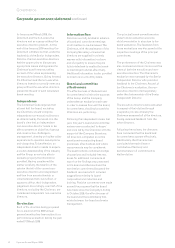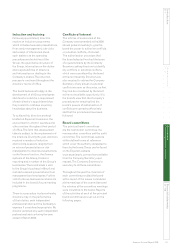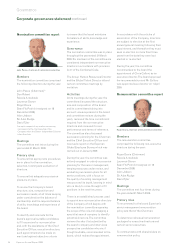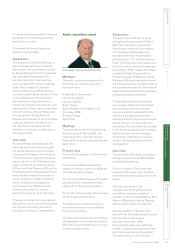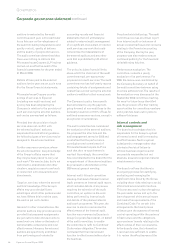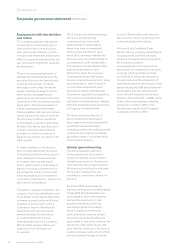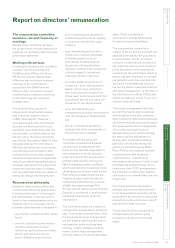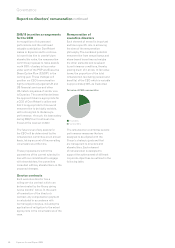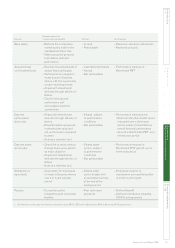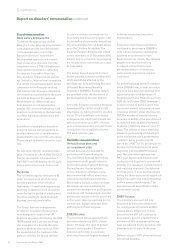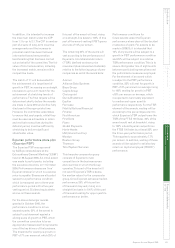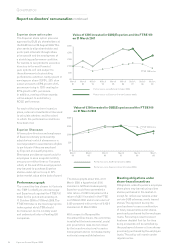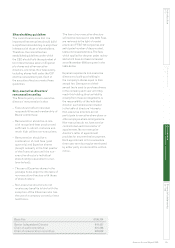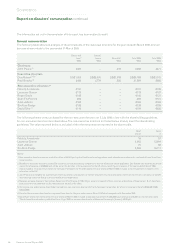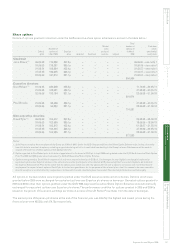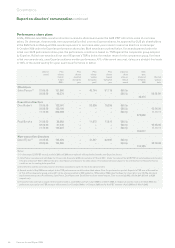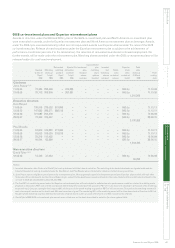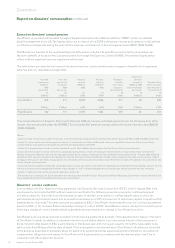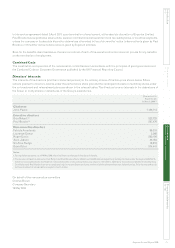Experian 2009 Annual Report Download - page 64
Download and view the complete annual report
Please find page 64 of the 2009 Experian annual report below. You can navigate through the pages in the report by either clicking on the pages listed below, or by using the keyword search tool below to find specific information within the annual report.
62 Experian Annual Report 2009
Fixed remuneration
Base salary and benets
To assess the appropriate market
salary for a role, external remuneration
consultants provide benchmark data
to the remuneration committee.
Executive directors’ salaries are
benchmarked against a mid-market
level of executive directors from the
companies in the FTSE 100 Index and
other global comparators, reecting
the markets from which Experian
recruits talent. These include, but are
not limited to, international companies
of a similar size and geographic scope,
companies in the nancial services
and related industries and companies
with signicant operations in the same
markets as Experian (for example,
North America). Before making a
nal decision on individual salary
awards, the committee assesses each
director’s contribution to the business,
to reect individual performance and
experience.
In addition to base salary, executive
directors receive certain benets-in-
kind including a car or car allowance,
private health cover and life assurance.
These are set at market norms for each
role.
No executive director received a base
salary increase at 1 April 2009. The CEO
has not received an increase since 1
April 2007 notwithstanding the Group’s
strong performance over this period.
Pensions
The retirement age for directors is 60
under arrangements which broadly
provide a pension of two thirds of
nal salary, ill health and dependants’
pensions in addition to life assurance
cover during the period of employment.
Incentive payments (such as annual
bonuses) are not pensionable.
The Group has had arrangements
in place for a number of years which
were designed to ensure that UK
directors who were affected by the 1989
HM Revenue and Customs earnings
cap were placed in broadly the same
position as those who were not. With
the agreement of the trustees of the
pension scheme, the Group decided
to retain a notional earnings cap for
its existing and future employees, with
the exception of new senior executives
who are pensioned on full basic salary
up to the Lifetime Allowance. The
Experian Pension Scheme was closed
to new members on 31 December 2008,
subject only to exceptions approved by
the remuneration committee on a case
by case basis.
The Group has put security in place
for the unfunded pension entitlements
of UK executives affected by the
earnings cap, by establishing Secured
Unfunded Retirement Benets
Schemes (‘SURBS’). Further details
are provided under the disclosure of
the arrangements for each director.
In the US, Experian provides a Personal
Investment Plan (401k) which all US
employees, including directors, are able
to join. This is a dened contribution
arrangement to which participants are
able to contribute up to 50% of salary,
up to a maximum salary and participant
contribution limit established by the
IRS each calendar year.
Variable remuneration
Annual bonus plan and
co-investment plan
Annual bonuses are awarded for
achieving prot growth targets.
The committee believes that linking
incentives to prot growth helps to
reinforce Experian’s growth strategy.
During the year, Kepler advised
on the calibration of targets using
benchmarks that reect stretching
internal and external expectations.
Benchmarks include: broker earnings
estimates; earnings estimates for
competitors; straight-line prot growth
consistent with median/upper quartile
shareholder returns over the next three
to ve years; latest projections for the
current year; budget; strategic plan;
and long-term nancial goals.
2008/09 bonus
The maximum bonus opportunity for
executive directors is 200% of base
salary. However, this level of annual
bonus is only payable if Experian’s
nancial performance surpasses
stretching nancial targets designed
to deliver exceptional results to
shareholders.
Experian’s underlying performance
continued to be strong in 2008/09 in
what was an extremely challenging
business environment for both
Experian and our clients. The bonuses
payable to executive directors
in respect of this nancial year
are representative of this strong
performance in uncertain market
conditions.
For annual bonuses earned in respect
of the 2008/09 nancial year, executive
directors have been offered their rst
opportunity since the demerger of
Experian and Home Retail Group from
GUS plc in October 2006 (‘demerger’)
to defer receipt of some or all of their
bonus and invest it in Experian shares
(‘invested shares’) under the Experian
CIP. The number of invested shares
acquired on behalf of the executive will
be matched with an additional award
of shares (‘matching shares’) on a 1:1
basis. The release of these matching
shares to participants will be subject
to the achievement of a performance
condition, being growth in prot
before tax (‘PBT’) of 3% per annum on
average for the three nancial years
beginning with the 2009/10 nancial
year. The committee believes that
PBT is an appropriate measure as it
is aligned with Experian’s core growth
strategy. The release of invested shares
and matching shares will be deferred
for three years. If an executive resigns
during the three-year period he/she will
forfeit the right to the matching shares
and the associated dividends. The
executive would be entitled to retain
any invested shares.
2009/10 bonus
The maximum bonus which may
be earned by executive directors in
the coming year will remain at 200%
of base salary. Deferral of annual
bonus into the CIP will continue to
be voluntary, but it is intended that a
minimum of 50% of any earned bonus
must be deferred by any executive who
chooses to participate in the plan.
Deferral of up to 100% of earned bonus
will still be possible.
Governance
Report on directors’ remuneration continued


